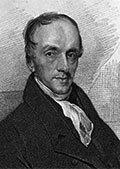the Second Week of Lent
Click here to join the effort!
Bible Commentaries
Watson's Exposition on Matthew, Mark, Luke & Romans Watson's Expositions
New Testament
Jesus' life, teachings, and fulfillment of Old Testament prophecies as the Messiah. Mark
A fast-paced account of Jesus' ministry, focusing on his actions and sacrificial death. Luke
Jesus' life, emphasizing compassion for the marginalized and the universal scope of salvation. Romans
A theological treatise on salvation, grace, faith, and righteousness through Jesus Christ for all.
Author's Biography
Rev. Richard Watson (1781-1833) was a distinguished British Methodist theologian and scholar, renowned for his contributions to theology, biblical studies, and education. Born in North Lincolnshire, Watson's early life was marked by a deep commitment to Methodist teachings, influenced by his family's devout Methodist background. His theological journey began with his immersion in Wesleyan theology, which shaped his understanding of Christianity and laid the foundation for his future scholarly pursuits.
Watson's intellectual prowess became evident during his studies at the Wesleyan Methodist school in Bristol and his subsequent enrollment at St. John's College, Cambridge. At Cambridge, he distinguished himself as a diligent student, earning a Bachelor of Arts degree in 1804 and a Master of Arts in 1807. His academic achievements were complemented by his unwavering commitment to Methodism, as he remained deeply involved in Methodist activities throughout his university years.
Upon completing his studies, Watson embarked on a career in ministry, serving as a Methodist preacher and pastor. His eloquence and theological acumen quickly gained recognition within Methodist circles, leading to his appointment as President of the Wesleyan Methodist Conference in 1826-an esteemed position within the Methodist hierarchy.
However, Watson's lasting legacy lies in his scholarly contributions to theology and biblical studies. He is best known for his magnum opus, "Theological Institutes," a comprehensive treatise on Christian theology that became a standard textbook in Methodist theological education. This seminal work reflected Watson's systematic approach to theology, blending Wesleyan theology with insights from biblical scholarship and philosophical reflection.
In addition to his theological writings, Watson also made significant contributions to biblical studies, particularly through his commentaries on the Bible. His commentary on the New Testament, in particular, remains highly regarded for its exegetical depth and theological insight.
Throughout his life, Rev. Richard Watson remained dedicated to the pursuit of theological truth and the advancement of Methodist principles. His profound influence extended beyond his own time, shaping Methodist theology and education for generations to come. Today, his legacy endures as a testament to the enduring impact of his scholarship and spiritual devotion.
